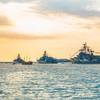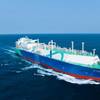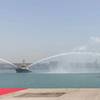With more than 75
percent of the nation's first Littoral Combat Ship (LCS) under construction,
the Lockheed Martin team completed another key milestone - installing the
ship's two main propulsion gas turbines. Freedom (LCS 1) is on schedule to
launch in the summer of 2006 and deliver to the U.S. Navy in early 2007, 24
months after the start of construction.
Freedom will be powered by an innovative combined diesel and gas turbine
propulsion plant, with steerable water jet propulsion. The two Rolls-Royce
MT30 gas turbines - the largest gas turbines ever to be installed on a Navy
ship - allow LCS to sustain sprint speeds well over 40 knots when lightly
loaded. Diesel engines, supplied by Fairbanks Morse, provide power for long
distances. Two fixed and two steerable Rolls-Royce water jets enable superior
maneuverability for mission execution.
The Lockheed Martin team design, a survivable, semi-planing steel
monohull, provides outstanding maneuverability with proven sea-keeping
characteristics to support launch and recovery operations, mission execution
and optimum crew comfort. The LCS design will be the first surface combatant
to be classed under the new Naval Vessel Rules by the American Bureau of
Shipping. The Lockheed Martin-led team includes naval architect Gibbs & Cox,
ship builders Marinette Marine, a subsidiary of The Manitowoc Company, Inc.,
(NYSE: MTW), and Bollinger Shipyards, as well as best-of-industry domestic and
international teammates to provide a flexible, low-risk warfighting solution.
More than two dozen modules that comprise the bulk of Freedom's hull and
superstructure are under construction at Marinette Marine and will be
assembled in precise order as the ship continues to take shape.
Featured videos

Xenos Marine Takes Aim at the Gulf Salvage, Decommissioning Markets

AI to the Rescue: Zelim’s ZOE to be Installed on Cruise Ship
April 2025
 Read the Magazine
Read the Magazine

 Read the Magazine
Read the Magazine
This issue sponsored by:

Saltchuk Doubles Down on Workforce Development Investments
Subscribe for
Maritime Reporter E-News
Maritime Reporter E-News is the maritime industry's largest circulation and most authoritative ENews Service, delivered to your Email five times per week









